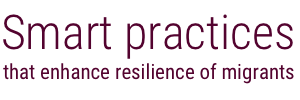A programme linking young migrants to older mentors, who provide them access to the knowledge, experience and networks of people established in the system, to increase the likelihood that migrants find work.
DUO for a JOB connects immigrant youth looking for work with experienced professional mentors in early retirement. Mentors can support them with their job search and provide ongoing mentorship. To qualify as a mentee, individuals must be between 18 and 30, of non-EU origin, pursuing a personal project, and registered with Actiris, the Belgian unemployment office. Mentors have to be over fifty and in early retirement with valuable professional experience and time to meet regularly with mentees. To participate in the programme, migrants and retirees submit a profile online to provide information on themselves and their interests. DUO then conducts an interview with interested parties to better understand their profiles and expectations. Within a month of placing the application, mentors are put in contact with mentees with similar profiles. A DUO for a JOB employee attends the first meeting between mentor and mentee to help facilitate the start of the relationship and ensure it runs smoothly, and monitors their progress throughout the mentorship. Then after a four-day training, the mentor supports the mentee to search for a job for a few hours a week for six months. The adolescent benefits from the professional experience and the support of his mentor, practices the local language and expands his network. In turn, the mentor engages in a social commitment, remains active by sharing his experience, sharpens his social skills and obtains a new social network.
335 duos have been realized since 2013.
Design. [P1] Focuses on the need of immigrants to find work. [P3] Supports the professional aspirations of immigrant youth.
- Guarantee quality of service while facing rapid growth.
- Diversification of funding sources to ensure sustainability.
- High welcoming standards and attention to the relations with mentees and mentors are important.
- Need a structured approach to mentoring with a strong support framework (training, handbook, supervision, etc.).
- Professionalism and use of alternative working model (new governance model, set up of social impact indicators, strong communication strategy, etc.).
Smart practices
Smart practices report and database survey
About the report
People migrate in pursuit of a better life for themselves and their families. As described in the International Federation of Red Cross and Red Crescent Societies’ (IFRC) Policy on Migration, “migrants are persons who leave or flee their habitual residence to go to new places – usually abroad – to seek opportunities or safer and better prospects.
Read more
About the International Federation

